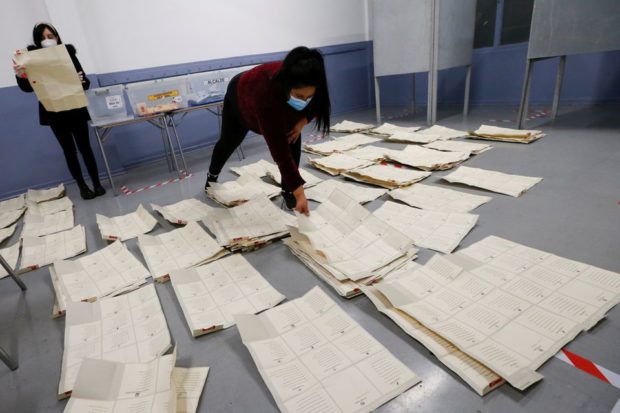
Poll workers wearing protective masks sort through and count the votes after polls closed during the elections for governors, mayors, councillors and constitutional assembly members to draft a new constitution to replace Chile’s charter, in Valparaiso, Chile, May 16, 2021. REUTERS/Rodrigo Garrido
SANTIAGO — Chile’s long-standing political parties were reeling on Monday following their bruising defeat in an election for delegates to rewrite the constitution that sowed doubts over their future as well as the fate of the country’s free-market model.
The ruling center-right coalition failed during the weekend vote to pick up the one-third of seats necessary to block radical changes during the convention.
And the center-left – which has dominated politics since the end of Augusto Pinochet’s 1973-1990 military dictatorship – garnered less support than leftists who have been pushing for wholesale change to the ‘Chilean model’ that has been credited with fomenting growth but also deep inequality.
Analyst Guillermo Holzmann called the result “a rejection of the political system in general… and a rejection of traditional political parties who obtained a lower share of the vote than in all the previous elections.”
Helped by a low turnout – abstention was near 58% – more than a third of delegates picked were independents.
Among the independent candidates who will be taking a seat in the neoclassical former congress building in central Santiago to draft the new charter is Alondra Carrillo Vidal, a 29-year-old psychologist.
Carrillo is a former spokeswoman of the powerful 8M Chilean women’s movement and was picked to represent the southern working class suburbs of Santiago as a member of a coalition of social groups that emerged out of protests over inequality that exploded in 2019.
Carrillo said her success “against all the odds” sharpened her determination to push through fundamental change and rejected talk by members of President Sebastian Pinera’s Chile Vamos coalition of potential consensus-building alliances.
“We are the majority in the convention, the traditional parties have lost outright,” she said. “We are not going to delegate our voice to those who claim to represent us.”
Some independents were linked to business, religious leaders, or traditional parties, but most had mandates from the grassroots, she said. “So we are not going to make alliances with the right and we are not going to waste this opportunity.”
‘Modest uncertainty’
Chile’s peso plunged on Monday and its IPSA stock exchange took a sharp hit after Pinera’s coalition flopped.
Rating’s agency S&P said it saw “modest uncertainty” in Chile following the surprise result, with presidential elections set for November. But it predicted that economic growth would recover rapidly as the pandemic recedes and copper prices surge, a boon to government coffers in the world’s top producer of the red metal.
“We expect Chile’s transition to a new constitution over the next couple of years to be stable, sustaining investor confidence,” the agency said in a note on Monday.
Fitch also underscored Chile’s solid financial position, saying it felt the country “will be able to withstand significant political and economic uncertainties.”
Delegates are set to meet shortly to define the rules of the process, and will then spend a maximum 12-month period debating and crafting the new text before Chileans vote on the final product. If it fails, Chile will revert to the current text.
Joaquin Villarino, a Chilean mine industry veteran and head of umbrella group Consejo Minero, told Reuters he hoped the delegates would embrace moderation.
“This space for dialogue must be characterized by serious and well-founded discussions,” he said, warning that if short-term extremists gain the upper hand, “there will be reasons for pessimism.”
Business chamber head Juan Sutil told Diario Financiero that he hoped all changes would “reinforce democracy and the principles that will allow Chile to keep developing.”
“Independent candidates have a lot to say, I think they can inject a lot of rational and sound criteria,” he said.